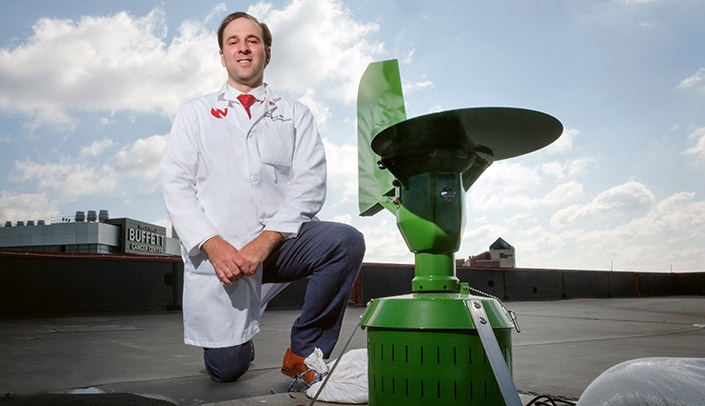Anyone who suffers with seasonal allergies knows all too well what the first signs of spring bring: pollen.
As the weather warms up trees, weeds and grasses begin releasing pollen into the air and anyone susceptible to whatever particular tree or grass or weed is releasing that fine powder is affected.
Allergist Andrew Rorie, M.D., treats plenty of patients for those allergies, sometimes with medications, and sometimes with monthly allergy shots.
“Spring can be a pretty miserable time of year for some people,” said Dr. Rorie, an assistant professor in the Department of Internal Medicine/Division of Allergy & Immunology at the University of Nebraska Medical Center.
As someone who suffers from seasonal rhinitis, Dr. Rorie would like to know exactly what pollens are floating around in the air on any given day in order to more effectively treat his patients.
In order to do so he had a volumetric air sampler installed on the roof of the Durham Research Center II.
This fancy little green machine, sporting a tail fin and canister-like body, is designed to sample airborne particles continuously for seven days, at the end of which the samples are collected.
Those samples are then stained and analyzed under a microscope for identification, Dr. Rorie said.
“Tree pollens are the biggest culprits that we find in March, April and May, then grass pollens start circulating in the air,” he said.
Dr. Rorie’s interest in aerobiology is an amalgamation of his love of the outdoors born from his youth growing up on a farm in Elmwood, Neb., his interest in immunology and his desire to help patients.
Dr. Rorie said he is currently in the process of making UNMC an official pollen counting station by becoming a certified pollen counter through the National Allergy Bureau.
This would make UNMC one of only two certified pollen counting stations in the Midwest, he said.
Dr. Rorie said he is waiting for shipments of lab supplies, but expects to begin pollen counting by the end of June.
“Our goal is to start an allergy fellowship program to teach fellows about aerobiology and insure they have a good understanding of pollens, and molds,” he said.
Once they begin collecting samples, Dr. Rorie said the data they generate will be of great use to those who track health outcomes and climate change.
The results of the pollen counts will be made public and shared via Twitter twice a week and on the UNMC Department of Allergy and Immunology website.

Awesome job! More data = better science and better health.
As an allergy sufferer, I had no idea that only ONE pollen counting station is certified in the midwest! So glad Dr. Rorie is doing the work to get UNMC certified. More knowledge will be a benefit to those of us that need to plan our outdoor activities in consideration of what's in the air!
Thank you!
Exciting! Way to go Dr. Rorie!
Thanks for doing this! I appreciate your data being made public.
Great initiative, and a needed one! Thank you for doing that, Dr Rorie.
Wow! What a great opportunity! Way to go!